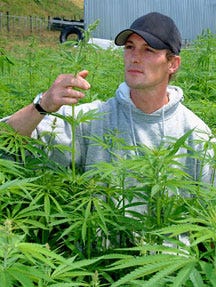Hemp is the ultimate cash crop, let U.S. farmers grow itHemp is the ultimate cash crop, let U.S. farmers grow it
June 7, 2013

The United States is the only industrialized country that bans hemp. At the same time, we're also the world's largest consumer of hemp products. Our penchant for everything from hemp seeds, oils, soaps, clothing, paper and more has contributed to a more than $450 million industry—money that should be finding its way back to U.S. farmers. Hemp produces more fiber, food and oil than any other plant on earth and I think it's high time our U.S. farmers are able cash in. Here are three more reasons it's time to bring hemp back home.
 Hemp farming adds green jobs. In an era of high unemployment, deregulating industrialized hemp would provide jobs to fuel a new greener economy. It's time we move away from antiquated, polluting jobs (i.e. Fracking) towards sustainable industries that could help address rather than contribute to climate change. Hemp supports our planet since it requires little fertilizer, herbicides or pesticides, can grow almost anywhere and actually filters toxins found in the soil through a process called phytomerediation.
Hemp farming adds green jobs. In an era of high unemployment, deregulating industrialized hemp would provide jobs to fuel a new greener economy. It's time we move away from antiquated, polluting jobs (i.e. Fracking) towards sustainable industries that could help address rather than contribute to climate change. Hemp supports our planet since it requires little fertilizer, herbicides or pesticides, can grow almost anywhere and actually filters toxins found in the soil through a process called phytomerediation.
Hemp is one of the most sustainable crops on the planet. Did you know that just one acre of hemp yields more than 8,000 pounds of hemp seeds? An acre also produces over 300 gallons of hemp seed oil and a byproduct of 6,000 pounds of high protein hemp flour. This oil can be used as both fuel and biodiesel fuel. Soybeans, sunflower seeds and rape seed, which are currently considered the most productive seed oil crops, only produce between 100 to 120 gallons of oil per acre. Hemp outdoes them by nearly three times.
The seeds are seriously nutritious. In addition to tasting delicious, hemp is really good for us. I add one tablespoon to my smoothie every morning for protein and all nine amino acids. Hemp also has high a perfectly balanced ratio of omega 3s and 6s and is really easy to digest unlike some seeds and nuts which can cause bloating.
The good news is that momentum is building to change the current legislation. “The utilization of hemp to produce everything from clothing to paper is real,” said Senate Minority Leader Mitch McConnel (R-KY) in a press release from the Hemp History Week organizers. McConnel recently came out in support of hemp farming by co-sponsoring S.359, the Senate companion bill to the Industrial Hemp Farming Act of 2013 (HR 525), introduced in February. “If there is a capacity to center a new domestic industry in Kentucky that will create jobs in the difficult economic times, that sounds like a good thing to me.” You can sign a petition here to encourage that the addendum is passes.
Find the full text of the bills at VoteHemp.com/legislation and voice your support by signing this petition.
You May Also Like



